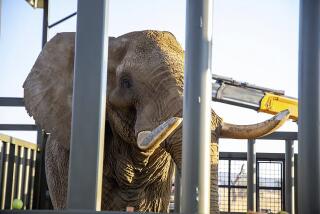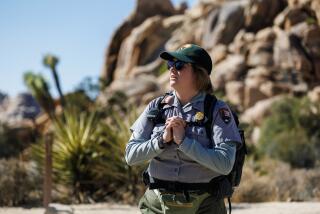Live From the Kenyan Savannah, It’s ‘Safari!’
- Share via
MASAI MARA, Kenya — As the first rays of dawn gently flood the horizon, two mud-spattered Land Rovers with BBC camera crews begin winding their separate ways over deeply rutted dirt roads.
Quietly, the vehicles move through the Musiara swamp, where a pride of lions is breakfasting on a freshly killed zebra, and past small herds of elephants, gazelles and other animals that live in these rich vast plains--the savannah that includes the Masai Mara game reserve in eastern Kenya near the Tanzania border.
The two crews will rendezvous at a narrow crossing on the nearby Mara River. Positioned on opposite banks of the swift-flowing river, their vehicles and video cameras hidden from view, they wait for one of nature’s spectacles as hundreds of thousands of wildebeest must cross the perilous river as they migrate south to the Serengeti and fresher grass.
Suddenly, a herd of several hundred wildebeest, or bearded gnus, which had been quietly grazing nearby, surge forward and plunge into the muddy currents. Fifteen minutes later their struggle is over. While most of the herd crossed safely, a number were drowned or swept downstream to waiting crocodiles.
The segment, part of 10 days of preshooting, will be inserted into some of the 21 live satellite feeds that the BBC’s Natural History Unit will transmit from here beginning Friday through Sept. 28 to the United States, Britain, Japan and Spain.
The live programming is designed, like similar programs the BBC has done in the past, to show natural wildlife phenomena in real time and to offer viewers a panorama of animals and their daily activities in one of the world’s richest wildlife reserves.
The complex technological project, the most ambitious the BBC has undertaken, is a co-production of BBC Enterprises and the Discovery Channel, a five-year-old nonfiction cable programmer based in Landover, Md.
In the United States, “Safari Live! Africa Watch” will be aired by Discovery in segments, beginning with a half-hour live program at 7 p.m. (PDT) Friday (5 a.m. in Kenya). Another half-hour program will air live at 9 p.m. (PDT) Friday and will be repeated at 7 p.m. (PDT) Saturday, and 50 minutes of highlights will air Sunday at 7 p.m. (PDT). On Sept. 28 at 7 a.m. (PDT), Discovery has scheduled “Student Safari,” a two-way hookup between Kenya and the studio of TV station WJLA in Washington, where area students will pose questions to wildlife experts in Kenya.
“This is the most ambitious programming we’ve ever done because it involves two partners who have developed the technology and the format to bring this type of programming from such a remote location,” says Discovery spokesman Eric McLamb.
In addition to the BBC co-production, on Tuesday Discovery will air “Ivory Wars,” an original production done in association with the World Wildlife Foundation that documents the slaughter of elephants by poachers for their ivory tusks.
For the BBC, this co-production with Discovery also breaks new ground. “This is the first time that the BBC’s Natural History Unit has mounted a full-scale broadcast from such a remote location without conventional video trucks that are normally an essential part of this type of operation,” says BBC “Africa Watch” producer Robin Hellier.
The production is a mind-boggling undertaking that involves flying 170 crates with more than 5 tons of equipment--much of it specially designed--into Kenya, where it must be moved to the Masai Mara and reassembled at several transmission relay sites. In addition, the BBC had to set up a camp, complete with armed guards, to house and feed nearly 50 people for two weeks.
“It’s like planning a military campaign,” says Hellier, who carries two thick green notebooks detailing everything from radio equipment to bug spray.
Without a partner, the costs would have been prohibitive. This co-production with Discovery, like one from the Red Sea last year, reflects an increasing trend by the BBC to use the resources of the American cable television industry to expand its programming.
The BBC will spend at least $600,000 to do “Africa Watch.” Discovery agreed to pay the BBC $250,000, but additional costs for staff and production expenses, satellite transmissions and its student program will bring final costs closer to $500,000. In addition, Discovery will spend another $500,000 on “Ivory Wars.”
Hellier’s goal for the satellite transmissions is to have about 60% live programming mixed with the prerecorded segments, such as the wildebeest crossing. The BBC producer compares the two elements to the difference between watching a football game live versus game highlights. “There is something very different about watching something live and not knowing what will happen next. It has a pace of its own.”
While such live programming carries the risk that the animals and the cameras will not be in the same spot at the same time, Hellier is confident that the rich array of wildlife here, plus the recorded segments, will provide viewers with a real glimpse of how the animals live.
In addition to using radio-linked Sony 330 cameras in four vehicles plus one remote camera, the BBC has had to devise a complicated internal communications system for Hellier, the cameramen and program narrators.
Even more complicated are the transmissions from the Masai Mara. Since there is no feasible way to send satellite transmissions directly from its campsite, the BBC set up a series of hops for radio signals to reach Kenya’s earth station in the middle of the Rift Valley. From its nerve center at Crocodile Camp on the edge of the game reserve, the transmissions will go to a point above camp that the BBC has nicknamed “Wireless Ridge.” From there, the signals go to Hospital Hill near the top of a range of mountains near Aitong. Then they are relayed to Masai Mountain, where the BBC staff will work from a cattle hut owned by a Masai farmer. The signal then goes to Kenya’s earth station KPTC (Kenya Posts and Telecommunications Corp.) at Longonot in the Rift Valley, and then to an Intelsat satellite. It will take less than half a second for the signal to leave the campsite and reach the United States.
Amid these complex preparations, there have been some lighter moments. When BBC staffers stopped to survey their potential campsite, they found lions lounging where their tents would be. Later, as the camp was being set up, the wires for electricity had to be raised so the elephants wouldn’t knock them down.
But no one seemed to mind. As one BBC staffer said, “It’s going to be hard to top this.”
More to Read
The complete guide to home viewing
Get Screen Gab for everything about the TV shows and streaming movies everyone’s talking about.
You may occasionally receive promotional content from the Los Angeles Times.






